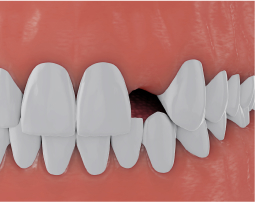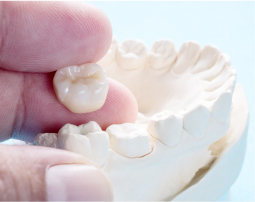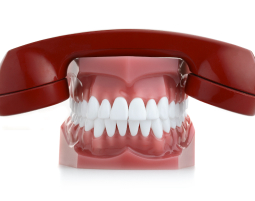The Benefits Of Routine Professional Teeth Cleaning
Your oral health depends on two factors: your willingness to brush and floss regularly and your commitment to seeing your dentist every six months for an oral exam and professional teeth cleaning. You may wonder why you need to visit the dental professional so often if you are taking great care of your teeth and gums on your own, but even the most diligent patients can miss hard-to-reach areas of the mouth and leave themselves vulnerable to tooth decay and periodontal disease. Your six-month oral exam will ensure that your dentist spots any problems early in their development, but professional teeth cleaning may prevent those oral health issues, the most devastating of which is periodontal disease, all together.
Professional Teeth Cleaning To Prevent Periodontal Disease
Most commonly referred to as gum disease, periodontal disease begins with plaque, the sticky biofilm that continually forms in your mouth. Brushing twice a day and flossing at least once daily can help you remove plaque before it causes any problems. However, many patients have trouble removing every bit of this sticky substance, especially along the gumline and between teeth that are crooked or crowded. If plaque is not removed within about 48 hours after it forms, it begins to calcify into tartar, a hard substance that cannot be removed with brushing or flossing.
However, your dental hygienist can remove these stubborn deposits with a special instrument. Having tartar removed can help prevent gum disease and keep the earliest stages of the condition (gingivitis) from progressing to the more advanced and irreversible stages (periodontitis).
The Stages Of Gum Disease
Gum disease is a progressive condition with three stages:
Gingivitis: Plaque contains numerous strains of bacteria, many of which can irritate the gums and cause them to swell and bleed. This is the first stage of gum disease and is completely reversible. A thorough professional cleaning coupled with vigilant cleaning techniques at home, which your dental hygienist will demonstrate for you, will usually restore your gum tissues to optimal health.
Periodontitis: This stage of gum disease occurs when tartar along the gumline breaks the attachment of the gums to the teeth, causing bone loss and periodontal pockets. These openings between the gums and teeth trap food particles and bacteria that damage the structures holding the teeth in place. A therapeutic (deep) cleaning by your hygienist or dentist, which involves removing bacteria from the periodontal and root surfaces so that the gums can reattach to them, can help prevent more damage. Antibiotic therapy and antimicrobial rinses are also used in some cases to help control the infection. The use of topical numbing gel, swishing and rinsing with a numbing solution or use of an anesthetic to numb the area will keep you from any discomfort during the Scaling and Root Planning process.
Advanced Periodontitis: In this third stage of periodontal disease, the gums, periodontal ligaments and bone sustain so much damage that the teeth may begin to loosen. In the advanced stages, your hygienist cannot help you. You need more aggressive treatments from a Periodontist, such as laser surgery and bone or gum tissue grafts to help prevent tooth loss.
Your Comfort Comes First
Most patients find the professional teeth cleaning process easy to tolerate, and some actually enjoy it. However, patients with receding or sensitive gums may feel a slight amount of discomfort. If at any time you feel uncomfortable, let your hygienist or dentist know, and they can take measures to alleviate your discomfort, such as applying a topical numbing gel or swishing and rinsing with a numbing solution so that you do not feel the sensations of scaling and polishing. Taking these measures can help you feel at ease during the simple cleaning procedure so that you need not face more invasive gum disease treatments down the road.
How Teeth Cleaning Is Performed
For patients with healthy teeth and gums, and even in those who have the earliest signs of gingivitis, a teeth cleaning usually involves three simple steps:
Scaling: This procedure is carried out with a tool called a scaler. In cases where there are only a few small spots of hard calculus, your hygienist may use a manual scaler to remove tartar deposits from the teeth by gently scraping them. Tartar can also be removed with an ultrasonic scaler, which is an electronic device that uses a gentle vibration and a steady stream of water to break up larger pieces of tartar and wash away the particles.
Polishing: This step involves using a handheld tool with a spinning rubber head that polishes all tooth surfaces using a slightly abrasive paste. Polishing helps remove minor stains on the enamel and gives teeth a smooth surface that is less likely to attract plaque and oral bacteria.
Fluoride: In most cases, your dentist and/or dental hygienist will recommend a fluoride treatment after each cleaning. Applied as a rinse, gel, foam or a varnish, fluoride is a mineral that helps strengthen the enamel, which is the outermost layer of the teeth, helping it resist the acid attack that can lead to tooth decay.
Your Comfort Comes First
Most patients find the professional teeth cleaning process easy to tolerate, and some actually enjoy it. However, patients with receding or sensitive gums may feel a slight amount of discomfort. If at any time you feel uncomfortable, let your hygienist or dentist know, and they can take measures to alleviate your discomfort, such as applying a topical numbing gel so that you do not feel the sensations of scaling and polishing. Taking these measures can help you feel at ease during the simple cleaning procedure so that you need not face more invasive gum disease treatments down the road.
Improve your oral health with Ascent Family Dentistry
Dental Solutions For You

Are you missing a tooh?

I have a broken tooth. Help!

I want to feel confident about my smile.

I’m in pain. What do I do?

My snoring is keeping everyone awake!

I have questions about dentures. Can you help?

But I’m afraid to visit a dentist!

My gums are bleeding. Something’s not right!

